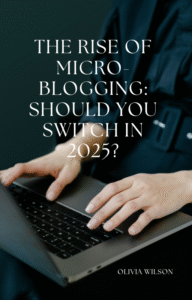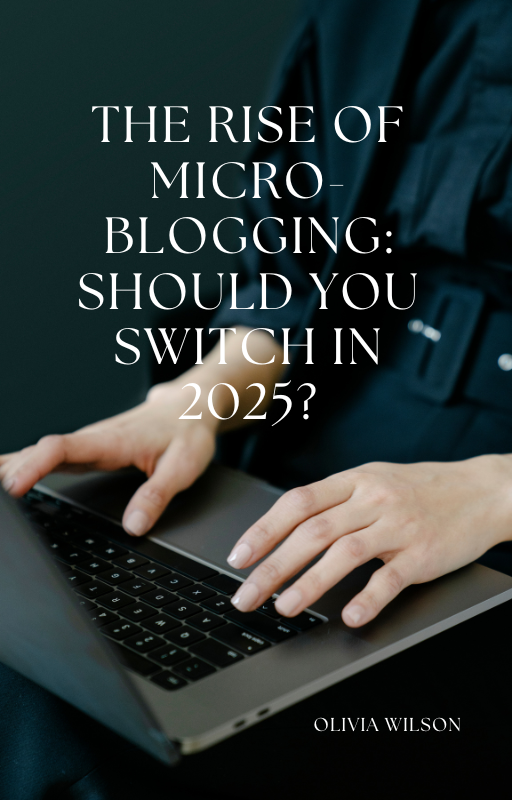Blogging in 2025: Trends That Will Shape the Future
Introduction
Blogging has evolved a great deal from its humble beginnings as online diaries in the late 1990s. What began as a means for people to post personal messages has become a multi-billion-dollar industry that defines digital marketing, brand authority, and online communities. As early as 2025, blogging has already become a fast-paced, technology-based platform where content producers are not only competing among themselves but also with sophisticated AI software, short-form video sites, and ever-evolving SEO algorithms.
Here, we’ll cover the recent trends that influence blogging in 2025, what’s trending today, and where we’re going. Whether you’re a beginner blogger, an experienced content writer, or an entrepreneur using blogs for driving traffic, this guide will provide you with a blueprint for success in the coming years.
The Evolution of Blogging (2000–2025)
To get a sense of where blogging is going in 2025, it’s valuable to consider how far it has come:
2000–2005: Blogging was primarily personal. Tools such as Blogger and LiveJournal permitted individuals to publish diaries, tales, and specialized interests.
2005–2010: Blogging turned professional. WordPress became dominant, and monetization options such as AdSense, affiliate marketing, and sponsored posts emerged.
2010–2015: The emergence of influencer culture. Bloggers turned into niche experts in areas such as fashion, food, travel, and technology. SEO became an overwhelming driver for traffic increase.
2015–2020: Visual platforms such as Instagram, YouTube, and TikTok dethroned blogging. Still, blogs continued to flourish on the basis of SEO, evergreen content, and long-form content.
2020–2025: AI tools, automation, and new content formats began reshaping the landscape. Blogs became less about daily journals and more about authority, credibility, and high-value information.
By 2025, blogging is no longer “just writing.” It’s a blend of writing, video, audio, visuals, and AI-driven insights designed to meet readers where they are.
AI’s Role in Blogging
One of the largest game-changers for blogging in 2025 is Artificial Intelligence (AI). AI has revolutionized how bloggers produce, optimize, and share content.
Content Creation Aid: Applications such as GPT-based models assist bloggers with generating ideas, creating outlines, and even crafting complete articles. Nevertheless, the best-performing bloggers understand how to inject human perspective and creativity to differentiate.
SEO Optimization: AI processes search trends, recommends keywords, and foretells which subjects will work best.
Personalization: AI can make blog content personal to each reader by processing their preferences, keeping blogs interesting and relevant.
Content Repurposing: AI processes turning blogs into videos, social media updates, and newsletters.
???? The future of blogging isn’t about battling AI—it’s about using it wisely. Bloggers who use technology along with genuine human voice will triumph.
SEO 2025: What’s Different:
SEO (Search Engine Optimization) was always key to successful blogging, but in 2025 it appears quite different:
Voice Search Optimization: With AI assistants and smart speakers, blogs now have to respond to conversational questions.
E-E-A-T (Experience, Expertise, Authoritativeness, Trustworthiness): Google prefers bloggers with personal knowledge and genuine insights over generic AI-generated posts.
Topic Clusters: Blogs that create content clusters on individual topics rank better than fragmented, unrelated posts.
Video & Visual Search: SEO is no longer text alone. Search engines index video clips, infographics, and podcasts within blogs as well.
User Experience Metrics: Page speed, formatting, readability, and mobile-friendliness are more crucial than ever.
Effective bloggers in 2025 prioritize value-based, well-formatted, multimedia content less, and keyword-stuffing more.
Content Formats: From Text to Multimedia:
Text-based blogging alone is not enough in 2025. Readers anticipate multimedia-enriched experiences:
Short Videos & Reels: Several bloggers incorporate TikTok-style videos to give concepts a rapid rundown.
Podcasts: Bloggers convert their content into audio form for time-crunched readers.
Interactive Elements: Quizzes, polls, and infographics boost engagement.
Visual Storytelling: Infographics, carousels, and image-heavy guides simplify complex subjects.
Text remains important—particularly SEO—but blogs that integrate written depth with visual and interactive components surpass traditional long-form pieces.
Blogging Niches That Are Thriving in 2025:
There are more profitable and evergreen niches than others. The following niches are trending in 2025:
AI & Technology: With advancing AI technologies, the audience hungers for tutorials, guides, and ethical debates.
Health & Wellness: Fitness, mental wellness, and biohacking are trending niches.
Finance & Investing: Wealth-building, crypto, and personal finance are in high demand.
Sustainable Living: Green tech blogs and eco-friendly lifestyles are popular.
Career & Education: Remote work, freelancing, and skill development are in vogue.
Travel 2.0: Digital nomad life and experiential travel interest readers.
Lifestyle & Self-Improvement: Remains a strong niche when merged with personal branding.
Bloggers who select evergreen niches with a forward-thinking spin are more likely to succeed in the long run.

Monetization Strategies in 2025:
Generating income from blogging in 2025 is simpler yet competitive. Bloggers are creating multiple revenue streams:
Affiliate Marketing: Still among the highest income streams, particularly for lifestyle and tech blogs.
Sponsored Content: Bloggers are paid by brands for product placements and collaborations.
Subscription Models: Gated content and premium newsletters bring in regular income.
Digital Products: Templates, online courses, and e-books are money-making.
Ad Revenue: Display and video ads are still prevalent but less consistent than before.
Membership Communities: Bloggers create communities where members pay for exclusive content.
The future is with bloggers who work their blogs as business ecosystems, and not merely content centers.
Social Media vs Blogging:
In 2025, social media sites such as TikTok, Instagram, and X (formerly Twitter) hold sway over online attention. However, blogging retains special benefits:
Ownership: You own your blog and its content, unlike social media.
Longevity: A blog post continues to attract traffic for years, whereas social media posts disappear soon.
Depth: Blogs can provide more detailed information and more in-depth storytelling.
Intelligent bloggers do both—utilizing social media for traffic and blogging for building authority.
The Ascendancy of Micro-Blogging & Short-Form Content
While full blogs continue to flourish, micro-blogging is gaining traction. LinkedIn articles, Twitter threads, and Substack newsletters are transforming the way individuals read content.
Bloggers are evolving by:
- Authoring concise, actionable pieces of content along with longer-form guides.
- Utilizing micro-content as hooks to lead readers into bigger articles.
- Constructing more robust email lists using micro-blogging networks.
In 2025, a good blogger understands how to blend short and long content effectively.
The Future of Blogging Communities:
Community-driven blogging is a big trend in 2025. Readers no longer desire one-way communication—they demand interaction.
Comments & Forums: Discussing blogs performs better.
Membership Communities: Paying groups, Discord servers, and Slack channels assist with building loyal followers.
Collaborations: Bloggers co-create content, podcasts, and video series.
Community gives blogs trust, credibility, and engagement—the key factors that AI can’t replicate.
Challenges Bloggers Face in 2025:
Despite opportunities, blogging in 2025 has challenges:
AI Over-Saturation: Many blogs look similar due to AI-generated content. Standing out requires authenticity.
Algorithm Dependence: Search engines and social media algorithms are unpredictable.
High Competition: Millions of blogs exist, making it harder to rank.
Short Attention Spans: Readers demand compact, interesting, and visually striking content. Bloggers have to concentrate on quality, uniqueness, and branding in order to beat entry barriers.
Opportunities for New Bloggers:
Competition though high, there’s still vast scope for new bloggers in 2025:
Untapped Niches: New domains like Web3, AI ethics, and space technology are emerging.
Personal Branding: Readers still read human stories instead of faceless AI stories.
Global Reach: Multilingual blogging enables reach into non-English markets.
Hybrid Formats: Combining blogs with YouTube, TikTok, and podcasts creates multiple revenue streams.
The playing field is crowded, but authentic voices and niche expertise always have room to grow.
Predictions for the Next 5 Years (2025–2030)
Looking ahead, blogging will continue evolving. Here’s what to expect:
AI-Human Collaboration: Hybrid content where AI provides research and humans add creativity.
More Multimedia Integration: Blogs will look like mini-magazines with videos, 3D visuals, and AR experiences.
Hyper-Personalization: Blogs customized for every reader’s interest and history.
Stronger Regulations: More regulation around sponsored posts, AI application, and copyright.
Emergence of Niche Authority Blogs: General blogs will be replaced by hyper-specific sites.
Conclusion:
Blogging in 2025 exists, prospers, and is more thrilling than ever. The market has evolved from basic personal diaries to AI-driven, multimedia-filled, authority-based platforms. Challenges do arise—such as saturation through AI and tough competition—but opportunities are enormous.
Success is to be found in authenticity, adaptability, and innovation. Bloggers who are open to technology yet remain committed to their singular voice will not only survive but prosper in the next generation of online content creation.
